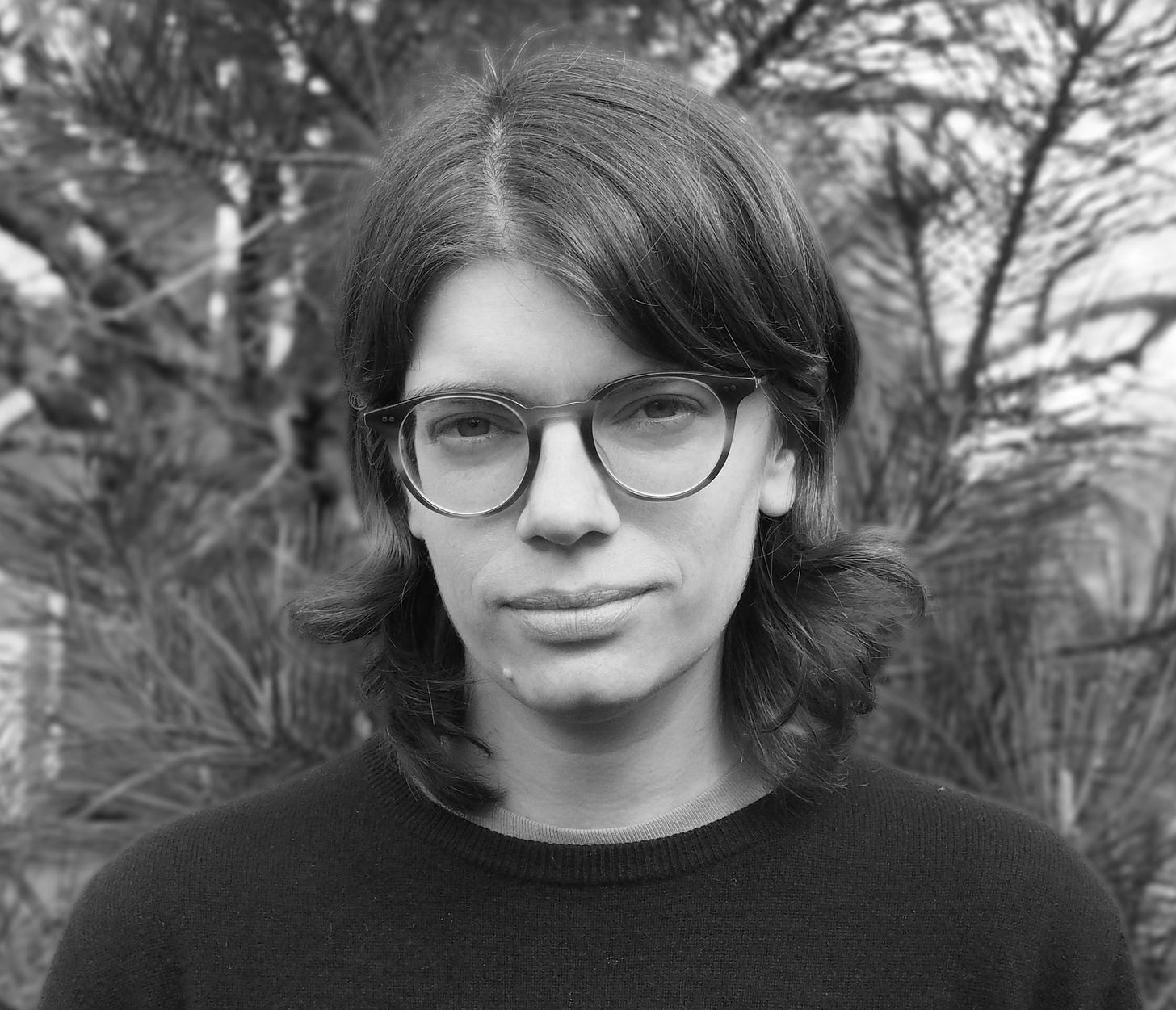On Elena Ferrante
Intertext Messenger with Jules Ohman
JULES OHMAN is the author of the novels Fire Years (forthcoming from Dial Press) and Body Grammar (Vintage). Their writing has appeared in Electric Literature, Lit Hub, Buckmxn Journal, Willow Springs, Camas Magazine, and others.
ELENA FERRANTE is a pseudonym for the Italian novelist of Troubling Love, The Days of Abandonment, and The Lost Daughter. Her four-book series of Neapolitan Novels are her most widely known works and include My Brilliant Friend (2012), The Story of a New Name (2013), Those Who Leave and Those Who Stay (2014), and The Story of the Lost Child (2015). TIME magazine called Ferrante one of the 100 most influential people in 2016. Ferrante has kept her true identity secret, and very little is known about her. She has stated in interviews that she was born in Naples, the daughter of a seamstress, and that she has three sisters. Her decision to privacy means there are no existing photos of her online.
Jules Ohman, 11:00 AM
Hello!
You, 11:01 AM
Jules! Hi!
What a glorious day. Are you in Portland?
Jules Ohman, 11:02 AM
Yes! I think it's the most glorious day we've had so far this year. I hate shorts but maybe I'll wear shorts later.
I'm trying to figure out how to turn off the AI suggest on this chat, I hate it haha
You, 11:03 AM
I'm in shorts on an outdoor patio. Long shorts I should say, which is all I wear now. Longer the better. Borderline pants, actually.
I wish I could help. I don't know how AI works at all... ever
Jules Ohman, 11:04 AM
That sounds lovely! I just got it, they really bury it.
I'm in a coffee shop and the whole shop is full of people in Trimet uniforms, it's very Portland
You, 11:05 AM
Is everyone smiling? Everyone smiles when the sun's out
Jules Ohman, 11:05 AM
Oh yes, it feels like we are in another dimension, where everyone is having a really nice time
You, 11:06 AM
It's a trip that I welcome as a midwesterner
You, 11:06 AM
Also: SO MANY CONGRATULATIONS on Fire Years coming out with Dial Press
Jules Ohman, 11:07 AM
Thank you!! A lot has happened on that front since we met a couple of months ago.
I'm very excited about it, super happy that it landed with Dial.
You, 11:08 AM
Is there anything else that's happened you can share here? Also, when does Fire Years come out?
Jules Ohman, 11:09 AM
Really just that it sold at all, it was on submission when we met, and things were feeling very up in the air.
But I've read a bit from it in public over the last couple of years, and you just never know if something is going to live in the world in a published form, especially with a novel. So I'm both relieved and happy that it will (you know, knocking wood, always).
Jules Ohman, 11:13 AM
Right now I think it'll come out in spring of 2027, which feels both very long from now and not very long
You, 11:14 AM
I know exactly what you mean
I'm JUST nearly finished with Body Grammar...
In parallel with studying Ferrante I'm thinking a lot about storytelling
I'm often fixated on syntax, grammar, voice, tone... and of course all of these are operating in Body Grammar but I think you and Ferrante are both narrative-oriented in a way I want to hone in on
Like Ferrante, do your stories stand separately from you as a writer? Imperatively so?
Jules Ohman, 11:19 AM
That's a great question, I have so rarely thought about my own work in the context of Ferrante and that question. But I'm delighted to now. We actually have a lot in common in that one regard, anyway, in that people are always conflating the plot and characters of Body Grammar with my life/life events. A lot of people have read it as memoir, or get confused and think it's a memoir. Which it really, really is not.
Body Grammar is like some aspirational version of what my adolescence might have been like if I'd known (or admitted) that I was queer as a teenager, or that I could be freer in my body and gender much earlier than I actually was
So I think Ferrante is such an interesting figure to me, because of that insistence on her part that the writer is not the story. Or a writer's identity doesn't matter and should be separate from the story.
Because I think as a queer writer (and as not a man), people often assume that you're writing from a place of total autobiography or something. Whereas I really am very much a novelist, very much writing from a place of emotional truth into a fictional world.
So I don't know about should, necessarily—there are lots of writers I love that write auto-fiction, or something that is way closer to plots and characters mirroring their own lives—but for me, I love narrative freedom that allows the writer to leap off from real life and into some other space that is not the plot of their own life.
You, 11:25 AM
These lines from Frantumaglia really sent it home, the severity of Ferrante's separateness from her books:
“The closer I get, and am inside it, the more overwhelmed the novel is by real details, and the book stops being a novel, and risks wounding me, above all, as the malicious account of a disrespectful ingrate.” (60)
Keep reading with a 7-day free trial
Subscribe to Intertext to keep reading this post and get 7 days of free access to the full post archives.



